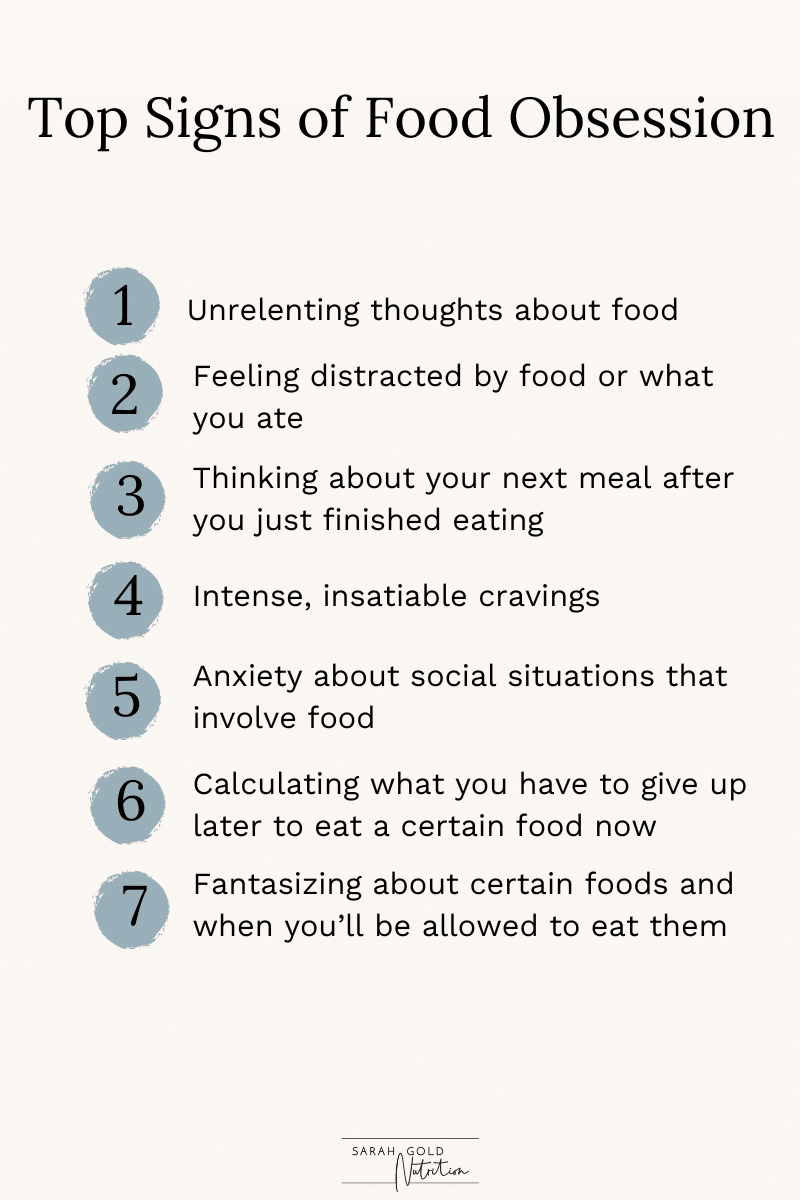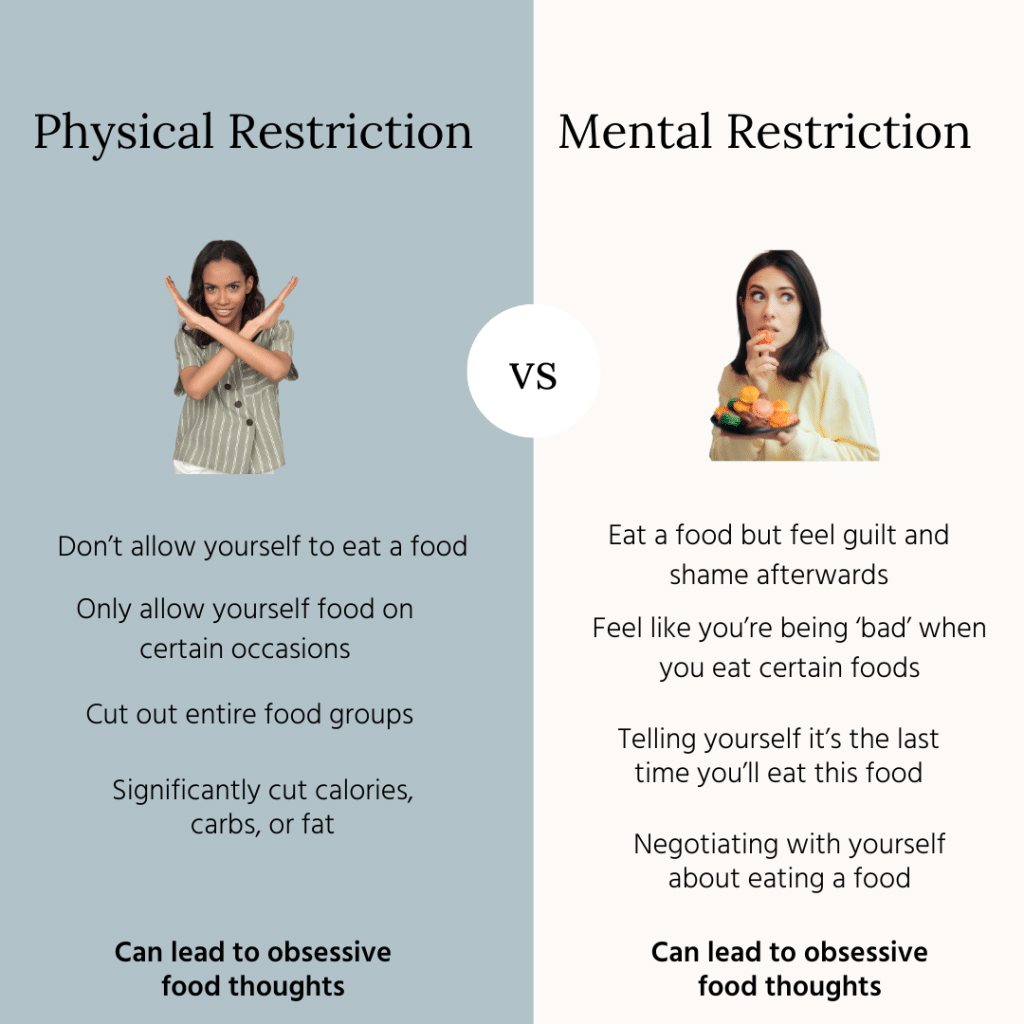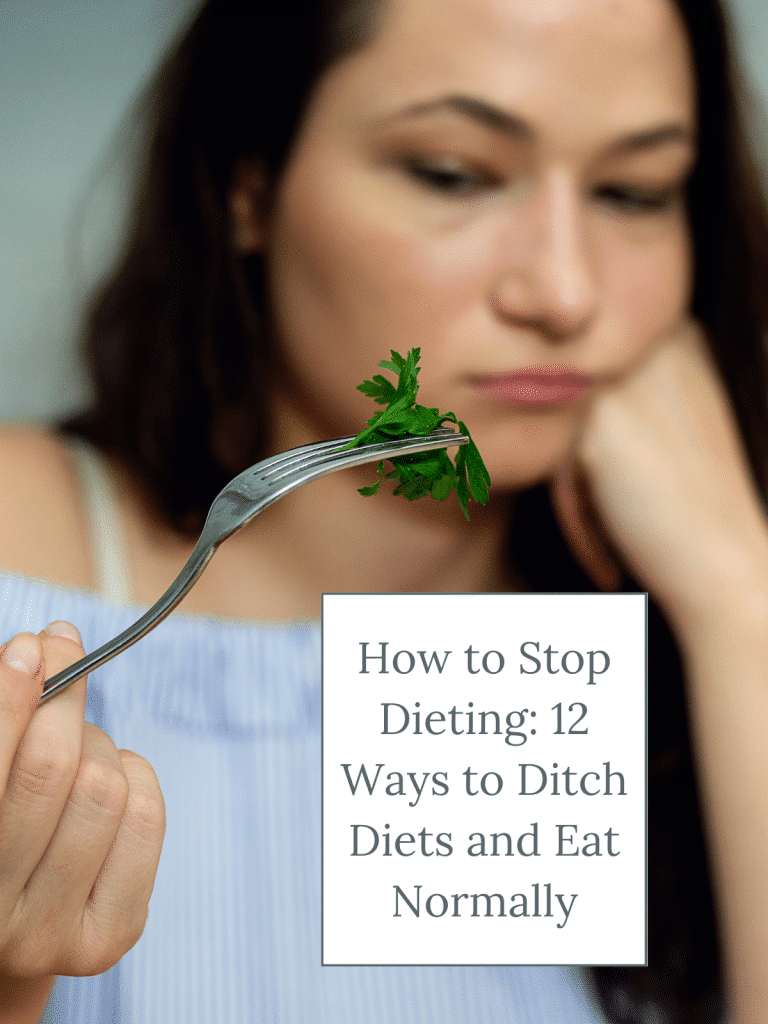Obsessed with food? Here’s why plus 3 tips to end the obsession
Obsessing about food is exhausting. It can often feel like an ongoing mental loop that takes over your thoughts. You might find yourself trapped in a never-ending cycle of questions: what to eat, when to eat, and how much to eat. Plus the guilt that follows when you don’t stick to the rules you’ve set for yourself.
This constant preoccupation with food can feel all-consuming and impossible to stop, especially since society has normalized worrying about every bite you eat.
But you don’t have to live this way. A life free from food obsession is not only possible, it’s incredibly empowering and rewarding.
Read on to learn more about the signs of food obsession, what causes it, and 3 steps to finally stop feeling obsessed with food—so you can get your life back!
What is Food Obsession?
Food obsession is when your thoughts are dominated by food and eating.
It may feel like you’re doing a lot of mental gymnastics—calculating calories left for the day, negotiating with yourself about when you can eat again, constantly thinking about what you’ll eat next (even if you just ate), or swinging between joy, guilt, or shame related to eating choices.
Signs of Food Obsession:
- Fixating on or unrelenting thoughts about specific foods
- Regularly thinking about when you get to eat again
- Thinking about your next meal immediately after finishing a meal
- Daydreaming about when you get to eat a certain food
- Feeling distracted by food or what you ate
- Calculating what you’ll have to give up if you allow yourself to eat a certain food
- Meticulously planning every meal and snack
- Intense, insatiable cravings for certain foods
- Spending hours looking at and saving recipes, reading food blogs, or watching food shows
- Intentionally saving calories for later
- Feeling anxious about social situations where food may be involved like vacations, celebrations and holidays
- Planning exercise around food to “burn off” the meal
- Mentally calculating your calories, macros or points
- Checking menus days or weeks ahead of when you’ll eat out and choosing what you’ll eat before you go
- Intensely reading all food labels and worrying about certain ingredients or nutrition facts
Many of these behaviors are normalized by diet culture and are SO common you may not even realize you’re doing it or that it’s a problem.

3 Reasons You’re Obsessed with Food
Frequent thoughts about food are often a sign that you’re stuck in a diet mentality (even if you’re not dieting).
You may have underlying food rules leftover from previous diets. Or rules and beliefs that you’ve collected from parents, friends, coworkers, or things you hear or read on social media.
Understanding the reasons behind food obsession can empower you to build a healthier relationship with food. The following are the top three reasons for food obsession.
You’re under-eating
Thinking about food a lot is actually a sign of hunger! It’s your body telling you it needs more energy. Your brain will begin to focus on food, even if you wish it wouldn’t.
Ignoring hunger cues and cutting calories can result in overeating later. Your body will seek to protect itself from what it perceives as starvation, which perpetuates food obsession with feelings of guilt and shame.
The landmark Minnesota Starvation Experiment clearly shows the impact of under-eating on food obsession. In this study, a group of healthy men followed calorie diet. They were allowed an average of 1700 calories per day, which is more than many popular diets allow these days.
Within weeks, participants began to show clear signs of food obsession. They would obsessively look at photos of food, manipulate their rations to look bigger and exercise to earn more calories.
These obsessive behaviors actually remained for months after the starvation period ended, but did eventually resolve when the participants had enough access to food on a regular basis.
This study emphasizes not only the idea that hunger can drive obsession, but significantly cutting calories can have lasting impacts on your mindset around food even long after you’ve stopped a diet.
You restrict certain foods or food groups
When you deem certain foods off-limits, such as carbs or sugary snacks, the forbidden nature can make them more tempting.
This is known as the “forbidden fruit phenomenon.” You crave what you can’t have, leading to intense food cravings. This leads to an intense focus on the food you can’t have.
Research confirms this. In one study, school-aged children were told they couldn’t have red M&Ms, but could have all the yellow ones they wanted.
Their obsession and desire of the red candy was significantly higher than the kids who could have any color they wanted. The study also found that kids whose parents restricted sweets at home ate a lot more of all of the candy than those who had regular access.
This is just one of many studies that highlight that restricting certain foods or food groups can backfire, causing a cycle of restriction and overeating.
You’re mentally restricting
Mental restriction happens when you allow yourself to eat a food but you feel guilt and shame after eating. This is usually because you believe you shouldn’t be eating because it’s bad for you or will make you gain weight.
This internal conflict often leads to obsessive food thoughts after eating. This is a result of years of dieting (even if you’re not currently dieting) or regular exposure to messages about certain foods being bad for you.
It’s not actually personal failure or lack of willpower, even though it may feel like it! In fact, obsessive thoughts are a result of biology and human nature.

3 Steps to Finally End Food Obsession
Overcoming food obsession can feel overwhelming but it is achievable by understanding your body’s needs, making peace with food, and reintroducing off-limits foods.
Below are our 3 steps to help you on this journey to finally end food obsession.
Start by Honoring Your Hunger and Eating Enough
Listening to your body’s hunger signals is the first step toward ending obsessive food thoughts. If you’ve long been restricting calories to lose weight, this may feel very hard. It’s ok to take it slow.
You might have lost touch with your own hunger cues, or feel like you can’t stop eating if you don’t control your portions. Check out the Intuitive Eating Hunger-Fullness Scale to work towards honoring your hunger and fullness.
Eating foods that satisfy your taste buds and you enjoy is important, too. Including a food that makes you happy can help you think about food less after a meal.
Work on Making Peace with Food
If you label foods as good or bad, or feel guilty after eating specific food, it’s time to work on shifting those food beliefs. This alone will help you ditch the guilt and take the power away from food and can diminish cravings.
This is that hardest part for most people! Begin by identifying food rules and beliefs that are keeping you stuck and then dismantle them one-by-one.
Start by asking yourself where these rules came from and do they whether or not they help you today.
Practice Food Habituation and Bring in Off-Limits Foods in a Safe Way for You
Once you’re eating enough and have worked through your food rules, it may be time to begin food habituation. This is the process of introducing previously restricted foods strategically to lessen their power over you.
This practice can end feelings of deprivation that often lead to overeating, emotional eating, and intense feelings of guilt and shame afterwards. It helps to normalize foods, which ends the constant thoughts in your head about why you let yourself eat a certain food.
Working with a certified intuitive eating counselor may be beneficial for support during this process.
Letting go of food rules and food habituation are a core part of the “U” in the UNDIET Method, our signature method to help you end food and body obsession and find joy in eating again.
Through this process, you learn to trust your body and are able to enjoy foods you love without feeling out of control. This lessens your food thoughts, takes foods off a pedestal and eliminates guilt after eating.
Final Thoughts: Obsessing About Food
You’re not alone in feeling obsessed with food. Remember, these feelings are often amplified by societal and healthcare pressures (driven by diet culture) rather than a lack of willpower.
However, moving away from obsession is possible. Obsessing over food often begins with restriction—whether it’s limiting calories, cutting out food groups, or adhering to rigid diet rules.
The irony is that the more you restrict, the more food can begin to dominate your thoughts. Gradually allowing yourself a wider variety of foods and leading with self-compassion can reduce your obsession with food.
Working with a dietitian who specializes in intuitive eating can help you end food obsession in a way that feels safe.
Ready to end food obsession? Get started with our free training “How to Feel in Control Around All Foods (without diets or willpower).”






